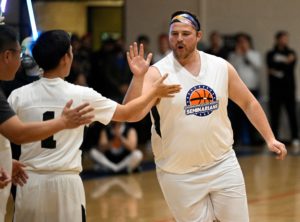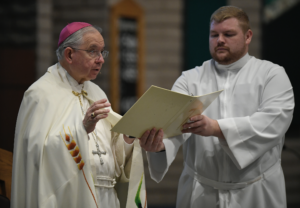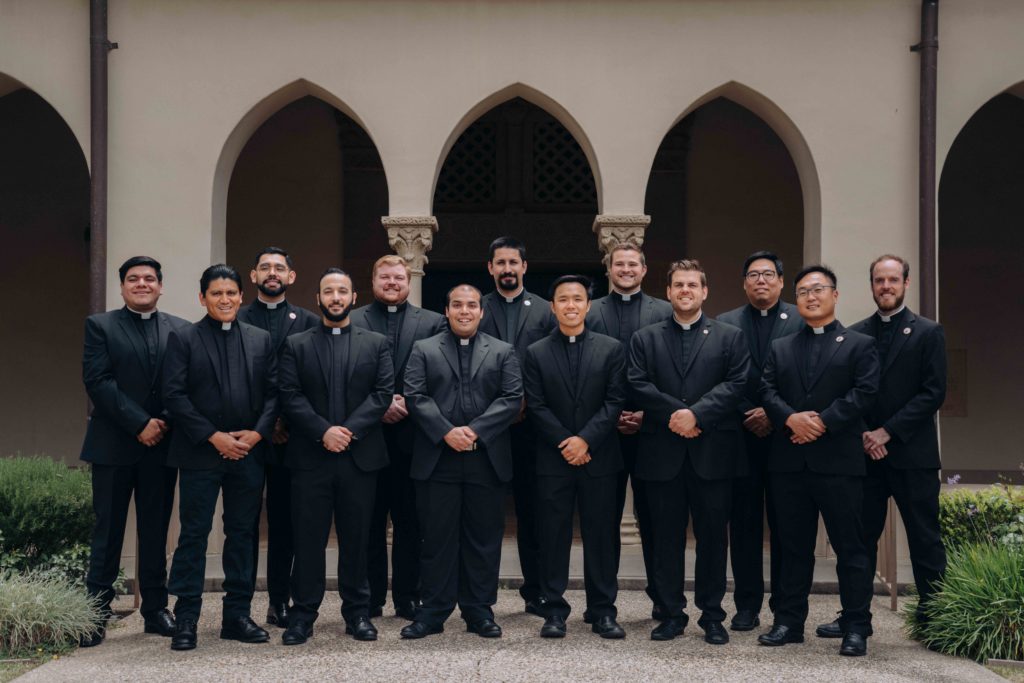If fostering vocations to the priesthood can be compared to the work of planting, growing, and harvesting, then this class is a bumper crop.
On Saturday, May 27, Auxiliary Bishop Marc Trudeau will ordain 13 men transitional deacons at the Cathedral of Our Lady of the Angels. Twelve of them will serve in the Archdiocese of Los Angeles, while another is being ordained for a diocese in China.
Los Angeles has not seen an ordination class this big since 2008, when 12 men were ordained to the priesthood.
“It’s a good problem to have,” replied Father Mike Perucho, vocations director for the archdiocese, when asked about any challenges that come with a class of this size. “One of the good things is you get a lot of different perspectives with a class this big.”
Perucho noted that this class is on the younger side compared to recent ones, but sees in them “men who are really on fire for the Faith.”
“They bring the best of what the Church offers. They’re very pastoral, with a great care for the souls they’re going to minister to.”
Among them is Thomas Green, who had very different aspirations a few years ago while playing football for Citrus College in Glendora. Catastrophe struck when he tore his meniscus and three ligaments in his knee all at once. His dreams of being recruited to a top Division 1 school were shattered.
Except, he added, that “when I thought my life was falling apart, it was actually falling together.”
That “low moment” in Green’s life led him to take his faith more seriously, bringing him to daily Mass, adoration, and lots of reading. That’s when he first felt the call to the priesthood.
A parishioner of St. Dorothy Church in Glendora, “this pull in my heart from the Lord” led Green to meet with Father Sam Ward, then the vocations director for the archdiocese.
“After meeting with Father Sam,” said Green, “I was convinced that this was the Lord’s will in my life.”
At age 20, Green entered Juan Diego House, and graduated from Cal State Dominguez Hills with a bachelor’s degree in philosophy and a minor in communications. But after being at St. John’s Seminary for a year, he “discerned out,” believing he needed more time to discern “if priesthood was where the Lord wanted me, or if it was marriage.”
He returned to the football field as an assistant coach and teacher at St. Paul High School in Santa Fe Springs, and also earned a master’s degree in theology from the Augustine Institute.
But in his second year of teaching and coaching, and after having dated a little bit, he felt that pull again — “so much so that I knew that the Lord’s will in my life was to re-enter seminary and become a priest.”
Green, 28, said his internship at St. Elizabeth Ann Seton Church in Rowland Heights was an important step.
“I have discovered that people need their priests to not only be men of deep prayer and a strong sacramental life, but to be human. People need a priest who can laugh, who has the capacity for friendship, who can accompany and relate with them, and who can love them as Christ loved those he ministered to.”

Green also knows full well that upon entering the seminary, “there is a lot that one gives up: a wife, having a family, a career, ‘freedom’ in a certain sense. Yet what I have discovered in deepening my relationship with the Lord is that when you give everything up to follow him, he actually gives you everything and even more in return.”
Unlike Green, Orange County native Anthony Huynh never had dreams of playing Division 1 college sports. But looking back, he can also see how God used athletics to call him.
When he was younger, Huynh got to know Norbertine seminarians and priests at annual summer camps at the old St. Michael’s Abbey in Silverado. The way they balanced a prayer life with the enjoyment of sports and games left an impression that planted the seeds of his vocation.
Later, during his parish internship year as a seminarian at Our Lady of Loretto Church near downtown, he found that sports helped him build rapport with the students and teachers of the school. That provided more opportunities for teaching the faith.
Huynh entered St. John’s Seminary a few months after graduation in May 2017 from California State Los Angeles, where he earned a bachelor’s degree in social work. “I was drawn to the priesthood mainly because I saw that priestly life was fulfilling, despite not having much wealth,” he said.
His St. John’s experience has only strengthened his resolve and desire to be a priest.
“Seeing others happy and excited about the good work God is accomplishing through me has made me grateful to God,” said Huynh, who is also fluent in Vietnamese and Spanish. “I look forward to continuing the good work as a deacon and priest, God willing.”

Work was largely at the center of Jaime Arriaga’s life before entering the seminary. Born and raised in Tenancingo, Mexico, he immigrated with his family to California at age 11. After high school, he held a series of jobs: warehouse and food processing clerk, machine operator, restaurant cashier, gardener, and auto mechanic.
Not surprisingly, priesthood was not even on the radar for Arriaga. Nor was much else.
“I was 26 at the time, I was working nonstop, and I was very stressed and unhappy with my life, which I thought was very monotonous,” he said. “I often thought to myself, ‘I want to meet new people, and do something different.’ ”
A friend invited Arriaga to a religious retreat. “I did not know what a retreat was,” he recalled, smiling, “but I didn’t care because for me it was a three-day vacation, a getaway from work, a time to relax. But that retreat allowed me to think about my life. I also saw how happy everybody was and I wanted to have that happiness.”
Until that point, “I was Catholic in name only,” he admitted, but that changed quickly. Arriaga became a lector and an extraordinary minister of holy Communion at his parish, St. Louis of France Church in La Puente, and volunteered with Young Adult Ministry for the Archdiocese of Los Angeles. His pastor eventually invited him to join a discernment group. Two years later, he applied to St. John’s Seminary and entered at the age of 30.
This year’s transitional deacon class also includes Weifang (Joseph) Tong, a seminarian being formed at St. John’s thanks to an agreement between his home diocese in Weinan, China, and the Archdiocese of Los Angeles, where he’s been welcomed by St. Frances of Rome Church in Azusa.
The deacons agree the most important part of discernment is remaining open to the will of God.
“Even if the priesthood does not end up being God’s call for you, he will show you the path to holiness wherever he calls you,” said Huynh.

